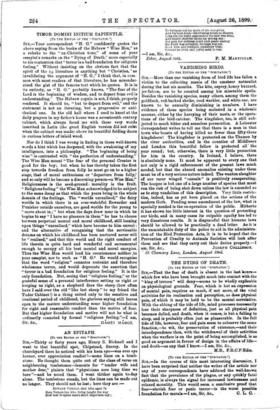TIMOR DOMINI INITIUM SAPIENTLE. •
[To THE EDITOR OF THE "SPECTATOR."] SIR,—Your correspondent "H. G." confidently quotes the above saying from the books of the Hebrew " Wise Men," as a rebuke to the " un-Christian tone," of some of your essayist's remarks on the "Dying of Death," more especially to his contention that " terror is a bad foundation for religions feeling." Without insisting on the obvious fact that the spirit of the c; literature is anything but " Christian, ' as invalidating the argument of "H. G.," I think that, in com- mon with most readers of that literature, he has misunder- stood the gist of the famous text which he quotes. It is in its entirety, as " H. G." probably knows, " The fear of the Lord is the beginning of wisdom, and to depart frOm evil is understanding." The Hebrew copula is not, I think, properly rendered. It should be, " but to depart from evil," and the statement is not an iterating, but a progressive or anti- thetical one. In the old hall where I used to kneel at the daily prayers in my father's house was a seventeenth century cabinet, which always faced me with these very words inscribed in Latin (the great English version did not exit when the cabinet was made) above its beautiful folding doors in curious letters of inlaid wood.
Nor do I think I was wrong in finding in those well-known words a hint which has deepened, with the awakening of my intelligence, into a philosophy. " The beginning of being wise" is contrasted with " the perfection of understanding." The Wise Man meant "The fear of the personal Creator is good for the boy; but when he has thereby taken the first step towards freedom from folly he must go on to a higher stage, that of moral enthusiasm or departure from folly,' and so only will he become a discerning person—a Wise Man." Religiousness is the seed-ground : morality is the fruit. " Religions feeling" the Wise Man acknowledged to be subject to the same decay as that which the years bring in the whole domain of the feelings. The " worlds unrealised," the fairy worlds in which there is an ever-watchful Rewarder and Punisher outside ourselves, are good worlds for the young to " move about in ; " but when the days draw near in which he begins to say "I have no pleasure in them " he has to choose between perpetual mental and moral childhood, still leaning upon things "unrealised," which have become to him unreal : and the alternative of recognising that the serviceable dreams on which his childhood has been nurtured never will be " realised," and that this world and the right conduct of life therein is quite hard and wonderful and sacramental enough to occupy all his best mental and moral energies. Thus the Wise Man would lend his countenance neither .to your essayist, nor to such as "H. G." He would recognise that the word "religion" connotes restraint and therefore wholesome terror, and would deprecate the assertion that " terror is a bad foundation for religious feeling." It is the only foundation. But, seeing that "religious feeling," or the grateful sense of a personal interference setting us right or keeping us `right, as a shepherd does the sheep (how often have I said over the old "like lost sheep" to my friend the Tudor Cabinet !) is a thing suited only to the sensitive and irrational period of childhood, the glorious saying still leaves open to the mature understanding some higher foundation for right and reasonable conduct than the motive of fear. Bat that higher foundation and motive will not be what is ordinarily connoted by formal " religious feeling."—I am,
I I I I


































 Previous page
Previous page